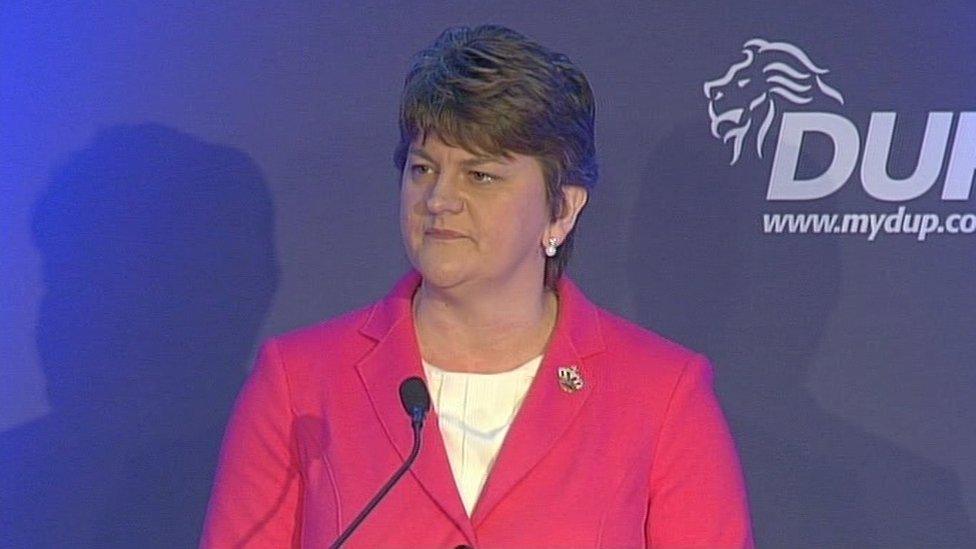Foster supports Anglo-Irish border control plan
- Published

NI First Minister Arlene Foster, who leads the Democratic Unionist Party, was interviewed on the 大象传媒's Hardtalk programme
Northern Ireland's first minister has expressed support for a joint UK and Irish effort to strengthen border controls at Irish ports and airports.
The idea was raised last month by NI Secretary of State James Brokenshire.
NI First Minister Arlene Foster said it would have to be agreed by the UK and Irish governments and other EU states.
She added that both governments had been discussing new ways to protect the borders of the Common Travel Area (CTA) even before Brexit vote in June.
The CTA consists of the Republic of Ireland, the UK, the Channel Islands and the Isle of Man and there are no passport controls for Irish and UK citizens travelling inside its borders.
'Special relationship'
Post-Brexit, however, Northern Ireland will be the only part of the UK that will share a land border with another EU state.
This has raised questions about how the Irish border will policed, how goods will be transported across it and how any new immigration restrictions will be enforced.
Speaking to an upcoming edition of the 大象传媒's Hardtalk programme, Mrs Foster said governments were "speaking this long before the European Union exit vote was taken".
"How do we protect ourselves as two islands against terrorism? How do we protect ourselves in other ways?
"And the way they were talking about was using the common travel area and having that special relationship between the United Kingdom and the Republic of Ireland recognised by them working very closely together."
However, the first minister added: "Of course this will have to be accepted by the other member states in Europe."
"This is the trick, as it were, because we can't enter into negotiations around any of this until Article 50 is triggered and the Republic's government are very keen to point out that they are not in negotiations at the moment, they're just in discussions."
Last month, Mr Brokenshire told the Guardian newspaper that in order to prevent illegal migrants entering the UK through the CTA.
"We have put in place a range of measures to further combat illegal migration working closely with the Irish government," he said.
"Our focus is to strengthen the external border of the common travel area [CTA], building on the strong collaboration with our Irish partners."
'Sporadic checks'
Mrs Foster rejected the suggestion that the UK's reliance on the Irish government to strengthen its borders would "fly the in face" of claims that the UK would have greater control over its borders after Brexit.
"No it doesn't, because you would only do it, in the terms that we're talking about, if we had full disclosure and openness between the two sovereign governments as to how it was going to work
"I think it's a very interesting concept," the first minister added.
"I think its a way to deal with a very particular circumstances of Northern Ireland, in terms of history and geography."
Mrs Foster also said she did not envisage lorries having to stop on daily basis for customs checks every time they passed between Northern Ireland and the Republic of Ireland.
However, she said there would have to be "sporadic" checks and said technology and paperwork could be used to monitor cross-border commerce.
"I'm reflecting on the fact that there are many land borders across Europe at the moment and there are many different ways in which they deal with the trade between the different areas and so they do deal in technological borders and they do deal in paperwork that his settled long before it gets to the border."
Arlene Foster's Hardtalk interview will be broadcast on 大象传媒 World News on Monday 5 December at 04:30 GMT.